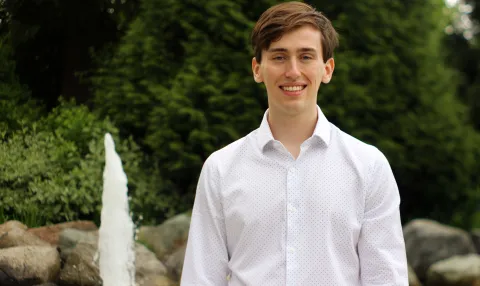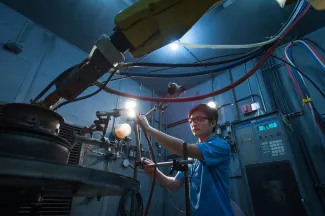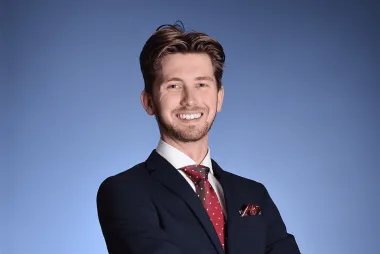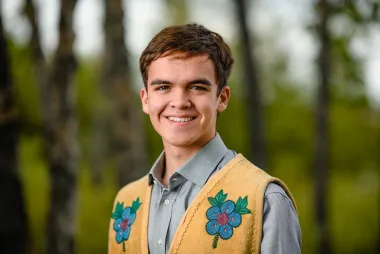"I have had the joy of connecting people to the resources and communities that they are seeking, all beginning with this principle of humble inquiry."

James Shaw
- Degree:
- Bachelor of Applied Science
- Grad year: 2020
- Program:
- Campus: Vancouver
I was born and raised in Oshawa, Ontario, a city halfway between Toronto and farmer fields. Oshawa is most well-known for the General Motors car assembly plant. The facility was in operation for over 100 years and put Oshawa on the map. I played hockey as a kid and attended a full French elementary and high school with my older sister. In many ways I enjoyed the classic Canadian upbringing. Planes fascinated me throughout my teens, so I decided to join the air cadet program. I earned my glider and power pilot licenses before heading off to UBC to study engineering.
I fell in love with the west coast mountains when I moved to Vancouver in 2015. Since then, gliding and power flying have taken a back seat to other interests.
Why did you choose to go into your field of study at UBC?
I chose to study at UBC because I wanted to see what the west coast of Canada had to offer. I had never visited, but heard Vancouver was an international hub. I figured that UBC would connect me to people from around the world. It all seemed so exciting! Studying engineering was a natural choice for me. Growing up, I spent plenty of time watching YouTube how-to’s, especially for experiments that “shouldn’t be tried at home.” Stationary, baking goods and tools often went missing around my house to make some smoke bomb, rocket or airplane.
I selected materials engineering as my discipline because I have sustainability on my mind. Why is silicon needed in solar panels, and how are they manufactured anyway? Why are some plastics biodegradable while others are not? Friendly professors answered these questions and prompted new ones. I chose materials engineering because I like to understand the properties of matter.
What has made your time at UBC memorable?
My time at UBC has been memorable due to the exceptional faculty and students. These amazing people bring personality to engineering practice. I know engineering can sound like a single monolithic approach. Know that when you set foot in a classroom or lab, you step into the interesting, sometimes wacky world of your lecturer. They might end up using charades to teach you how an X-ray Diffractometer works! Thanks to Prof. Wang, that lesson will be hard to forget.
Other memorable moments are when exceptional professors and students help you see a problem through a new lens. When I have difficulty solving a problem, I imagine I'm an esteemed prof or peer. What would Kaiya, Rayan, Mack or Yeedo do? These great peers and their approaches will stick around in my mind.
What has been your most valuable non-academic experience studying at UBC?
About a year ago I was on exchange at the National University of Singapore. I took a video call with Soundous, Geering Up’s Engineering Outreach Coordinator. Geering Up is a non-profit organization that promotes STEM to youth across British Columbia. Soundous told me that her team travels to Indigenous communities across the province delivering hands-on science lessons and activities. Through this conversation, I learned that Soundous, her team and I all shared a desire to address the under-representation of Indigenous students in STEM fields.
Fast forward one year, we're working to address the barriers of access to science education in remote communities. I've co-created science activities with Elders that incorporate Indigenous technologies and ways of knowing. We're also launching a Geering Up internship for Indigenous high-school students and developing a handful of programs that better align with the needs of Geering Up’s Indigenous partner communities.
Through these initiatives, I have traveled to many reserves. There is still much to learn from youth, leaders and Elders about how to address the problems that Indigenous people in Canada face today. These teachings breathe into all the other work that I do.
Tell us about your experience in your program. What have you learned that is most valuable?
I entered my engineering degree seeking answers to questions. What I have learned is this: it takes an insightful question to arrive at an insightful answer. Craft your research question with the intention of coming up with something new. Asking someone else’s question will bring you to their answer, so why not be make use of your own innate curiosity?
How are you applying the skills you learned through your studies at UBC?
I am applying the skills that I have learned at UBC by building new curriculum modules. These lectures and assignments will synthesize engineering first principles with Indigenous ways of knowing. Materials, Civil and Environmental Engineering lecturers will teach this curriculum starting this fall. I am looking forward to the rollout!
I am also applying my skills through the daily use of first principles found at the core of the engineering curriculum. When I learn something new, I try not to rely on memorization. I seek out the foundational knowledge from which you derive the more difficult answers. I apply these thinking principles to my work in STEM education and to my own personal projects. I'm using first principles to create my own cloud server (I'm tired of paying Google). I'm also furthering my capstone project research on 3D printable bioresorbable bone scaffolds.
What advice would you give a student entering your degree program?
Failure is feedback.
You will learn from your mistakes. Then, you will come up with a better game plan the second, third and twentieth time around. An undergraduate degree is an especially great place to fail. Friends, peers and faculty will be there to catch you.
I also encourage you to explore research both within and outside of your direct field of study. I have worked in a handful of research capacities, most of which were not within my home department. Reach out to professors in other departments and faculties if you are curious about their research. All that it takes is a little extra initiative.
How do you feel your degree has benefitted you compared to a different field of study?
An esteemed engineering professor once told me this: the engineering undergraduate experience is a “ticket to think” and is one of the earlier stages of lifelong learning. My degree has benefited me by equipping me with a tool belt and a couple of the essentials. I now understand that there is plenty more to do.
Where do you find your inspiration?
I find inspiration in my mother, father, sister and the rest of my family. They have been my number one supporters and role models. I would also like to mention Pamela Rogalski, Drs. Ke Zou, Chadwick Sinclair, Wenying Liu and Ian Mitchell. These are professors who have promoted my growth as an engineer and a human being.
I also find unending inspiration from open source content creators of the internet. These are tireless people who share their art, code and knowledge for all to learn and enjoy.
What are your immediate and/or long-term plans for the future?
My immediate plans are to continue working with Geering Up and the UBC Faculty of Applied Science. These science and engineering decolonization initiatives are necessary to fulfill the Truth and Reconciliation Commission of Canada's (TRC) Calls to Action. Afterward, I will be continuing my studies as an undergraduate student. I'm thrilled to begin UBC's accelerated Bachelor of Computer Science program this September.
I decided to continue my studies because there are several urgent, unmet needs at the interface of materials engineering and computer science. An interdisciplinary approach is necessary to get to the core of these challenges. During the 20-month Bachelor of Computer Science program, I will be combining my knowledge of materials and manufacturing with computer science to focus on pressing issues in the biomedical and energy sectors.
What are your future plans to make a difference in our world?
My plan is quite simple: I will observe before acting.
Opportunities to make an impact are often lost translation, so I seek to be present with people so that I can understand how to best serve them. This mindset has consistently produced meaningful change within my own life and to those around me in amazing, often unexpected ways! This mindset is also rather contagious, and I have had the joy of connecting people to the resources and communities that they are seeking, all beginning with this principle of humble inquiry.



